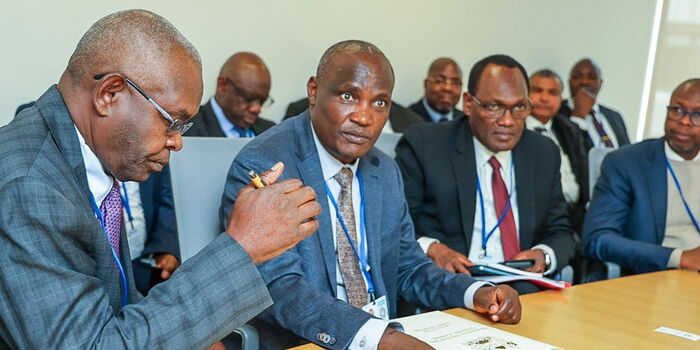The International Monetary Fund (IMF) has issued a caution to Kenya and Ethiopia following their recent decisions to repay part of their Chinese loans in yuan instead of the usual US dollar.
The warning comes after Kenya announced that it had switched the repayment of its massive Standard Gauge Railway (SGR) loan from dollars to the Chinese currency, a move aimed at reducing costs amid the weakening shilling and rising global interest rates.
According to the IMF, while shifting currencies can sometimes be a smart strategy for managing debt, such actions also come with significant risks.
A spokesperson from the Washington D.C.–based financial institution told Bloomberg that although the move may seem to save costs in the short term, it could expose countries to new currency-related vulnerabilities.
“While these transactions may help lower interest payments, they can also bring about currency risks depending on how they are structured,” the IMF spokesperson said.
“The IMF advises countries to include such decisions in broader, long-term debt and reserve management plans to maintain a proper balance between potential cost savings and financial risks.”
Kenya’s Treasury Cabinet Secretary, John Mbadi, confirmed that the government finalized the conversion of the Ksh646.15 billion (approximately USD 5 billion) SGR loan from dollars to yuan on October 7.
The loan, originally taken from China to fund the construction of the Standard Gauge Railway, has been a major part of Kenya’s debt portfolio for years.
Officials at the Treasury explained that switching the repayment currency from the US dollar to the yuan will lower the interest rates that were previously tied to the dollar.
This change is expected to save Kenya around Ksh27.78 billion (USD 215 million) every year, providing some breathing space to the country’s already tight fiscal situation.
The government believes that the move will ease the heavy burden of debt repayment, reduce financing costs, and minimize pressure on the Kenyan shilling, which has recently weakened against the dollar.
Just two weeks after Kenya’s decision, neighboring Ethiopia followed suit. On October 21, Ethiopian officials entered talks with Chinese authorities to restructure part of their USD 5.38 billion (Ksh695.23 billion) debt by converting it into yuan-denominated loans.
Ethiopia’s government hopes that this step will reduce its borrowing costs, strengthen trade relations with China, and provide greater stability in its debt management.
However, Kenya’s decision to shift to the yuan has also drawn political and economic attention. President William Ruto’s economic adviser, David Ndii, revealed that pressure from major Western financial institutions—especially the World Bank and the IMF—played a role in influencing Nairobi’s choice.
According to Ndii, these lenders were uneasy about the way Kenya was managing its loans, claiming that Nairobi was using funds from Western-backed dollar loans to repay Chinese debt instead of financing local development projects and budget priorities.
“The Western lenders questioned why they should continue helping us when the money they give ends up paying other creditors,” Ndii said.
“Because of that, they have been urging countries like Kenya to restructure their debts in a way that ensures their financial support stays within the country and contributes to domestic growth rather than going to pay other lenders.”
Experts note that while the yuan conversion may provide short-term relief, it also introduces new financial dynamics.
The move ties Kenya’s and Ethiopia’s repayments more closely to China’s currency fluctuations, which could affect the long-term stability of their debt portfolios.
Nonetheless, both nations see the shift as a step toward diversifying their financial options and reducing reliance on the US dollar, especially as the dollar continues to strengthen globally.
In summary, the IMF’s warning underscores the delicate balance African nations must strike between managing debt costs and avoiding new financial risks.
While the yuan-based repayment could offer immediate savings for Kenya and Ethiopia, experts emphasize that long-term planning and cautious implementation will be crucial to prevent future economic shocks.
Join Government Official WhatsApp Channel To Stay Updated On time
https://whatsapp.com/channel/0029VaWT5gSGufImU8R0DO30


